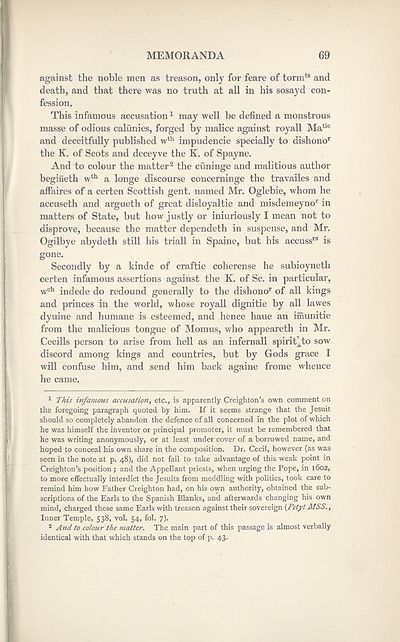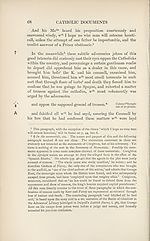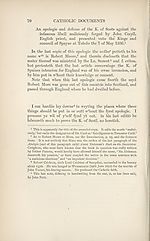Series 1 > Miscellany of the Scottish History Society (First volume)
(162) Page 69
Download files
Complete book:
Individual page:
Thumbnail gallery: Grid view | List view

MEMORANDA
against the noble men as treason, only for feare of tormts and
death, and that there was no truth at all in his sosayd con¬
fession.
This infamous accusation1 may well be defined a monstrous
masse of odious calunies, forged by malice against royall Matie
and deceitfully published wth impudencie specially to dishonor
the K. of Scots and deceyve the K. of Spayne.
And to colour the matter2 the cuninge and malitious author
begineth wth a longe discourse concerninge the travailes and
affaires of a certen Scottish gent, named Mr. Oglebie, whom he
accuseth and argueth of great disloyaltie and misdemeynor in
matters of State, but how justly or iniuriously I mean not to
disprove, because the matter dependeth in suspense, and Mr.
Ogilbye abydeth still his triall in Spaine, but his accuss™ is
gone.
Secondly by a kinde of craftie coherense he subioyneth
certen infamous assertions against the K. of Sc. in particular,
wch indede do redound generally to the dishonor of all kings
and princes in the world, whose royall dignitie by all lawes
dyuine and humane is esteemed, and hence haue an imunitie
from the malicious tongue of Momus, who appeareth in Mr.
Cecills person to arise from hell as an infernall spirit^to sow
discord among kings and countries, but by Gods grace I
will confuse him, and send him back againe frome whence
he came.
1 This infamous accusation, etc., is apparently Creighton’s own comment on
the foregoing paragraph quoted by him. If it seems strange that the Jesuit
should so completely abandon the defence of all concerned in the plot of which
he was himself the inventor or principal promoter, it must be remembered that
he was writing anonymously, or at least under cover of a borrowed name, and
hoped to conceal his own share in the composition. Dr. Cecil, however (as was
seen in the note at p. 48), did not fail to take advantage of this weak point in
Creighton’s position ; and the Appellant priests, when urging the Pope, in 1602,
to more effectually interdict the Jesuits from meddling with politics, took care to
remind him how Father Creighton had, on his own authority, obtained the sub¬
scriptions of the Earls to the Spanish Blanks, and afterwards changing his own
mind, charged these same Earls with treason against their sovereign (Petyt MSS.,
Inner Temple, 538, vol. 54, fol. 7).
2 And to colour the matter. The main part of this passage is almost verbally
identical with that which stands on the top of p. 43.
against the noble men as treason, only for feare of tormts and
death, and that there was no truth at all in his sosayd con¬
fession.
This infamous accusation1 may well be defined a monstrous
masse of odious calunies, forged by malice against royall Matie
and deceitfully published wth impudencie specially to dishonor
the K. of Scots and deceyve the K. of Spayne.
And to colour the matter2 the cuninge and malitious author
begineth wth a longe discourse concerninge the travailes and
affaires of a certen Scottish gent, named Mr. Oglebie, whom he
accuseth and argueth of great disloyaltie and misdemeynor in
matters of State, but how justly or iniuriously I mean not to
disprove, because the matter dependeth in suspense, and Mr.
Ogilbye abydeth still his triall in Spaine, but his accuss™ is
gone.
Secondly by a kinde of craftie coherense he subioyneth
certen infamous assertions against the K. of Sc. in particular,
wch indede do redound generally to the dishonor of all kings
and princes in the world, whose royall dignitie by all lawes
dyuine and humane is esteemed, and hence haue an imunitie
from the malicious tongue of Momus, who appeareth in Mr.
Cecills person to arise from hell as an infernall spirit^to sow
discord among kings and countries, but by Gods grace I
will confuse him, and send him back againe frome whence
he came.
1 This infamous accusation, etc., is apparently Creighton’s own comment on
the foregoing paragraph quoted by him. If it seems strange that the Jesuit
should so completely abandon the defence of all concerned in the plot of which
he was himself the inventor or principal promoter, it must be remembered that
he was writing anonymously, or at least under cover of a borrowed name, and
hoped to conceal his own share in the composition. Dr. Cecil, however (as was
seen in the note at p. 48), did not fail to take advantage of this weak point in
Creighton’s position ; and the Appellant priests, when urging the Pope, in 1602,
to more effectually interdict the Jesuits from meddling with politics, took care to
remind him how Father Creighton had, on his own authority, obtained the sub¬
scriptions of the Earls to the Spanish Blanks, and afterwards changing his own
mind, charged these same Earls with treason against their sovereign (Petyt MSS.,
Inner Temple, 538, vol. 54, fol. 7).
2 And to colour the matter. The main part of this passage is almost verbally
identical with that which stands on the top of p. 43.
Set display mode to:
![]() Universal Viewer |
Universal Viewer | ![]() Mirador |
Large image | Transcription
Mirador |
Large image | Transcription
Images and transcriptions on this page, including medium image downloads, may be used under the Creative Commons Attribution 4.0 International Licence unless otherwise stated. ![]()
| Scottish History Society volumes > Series 1 > Miscellany of the Scottish History Society (First volume) > (162) Page 69 |
|---|
| Permanent URL | https://digital.nls.uk/127082805 |
|---|
| Attribution and copyright: |
|
|---|
| Description | Over 180 volumes, published by the Scottish History Society, containing original sources on Scotland's history and people. With a wide range of subjects, the books collectively cover all periods from the 12th to 20th centuries, and reflect changing trends in Scottish history. Sources are accompanied by scholarly interpretation, references and bibliographies. Volumes are usually published annually, and more digitised volumes will be added as they become available. |
|---|


